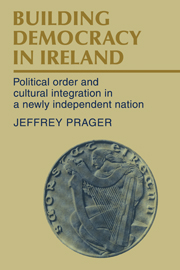 Building Democracy in Ireland
Building Democracy in Ireland Book contents
- Frontmatter
- Contents
- Preface
- Part 1 Democracy in Ireland: Theoretical and Empirical Problems
- Part 2 Patterns of Crisis Resolution in the Irish Free State, 1922–1932
- Part 3 The Character of Irish Democracy
- 7 The Democratic Achievement in Ireland: The Reconciliation of Culture and Politics
- 8 The Uniqueness of Irish Democracy
- Notes
- References
- Index
7 - The Democratic Achievement in Ireland: The Reconciliation of Culture and Politics
Published online by Cambridge University Press: 25 October 2011
- Frontmatter
- Contents
- Preface
- Part 1 Democracy in Ireland: Theoretical and Empirical Problems
- Part 2 Patterns of Crisis Resolution in the Irish Free State, 1922–1932
- Part 3 The Character of Irish Democracy
- 7 The Democratic Achievement in Ireland: The Reconciliation of Culture and Politics
- 8 The Uniqueness of Irish Democracy
- Notes
- References
- Index
Summary
Introduction: the Irish public and its problem
In the past four chapters, attention was directed to the political institutions, with little emphasis on the fractious and fragile character of the Irish public. The Civil War and the persisting debate over the meaning of the Anglo-Irish Treaty, it has been argued, ensured at best a weak public sphere incapable of generating a moral consensus on the role and aims of the state and its relations with other nations. The result was the one-sided achievement of the Cosgrave government; institutional efficacy was secured through the successful manipulation and enhancement of its resources, but political integration did not result.
Given its commitment to strengthen the democratic institutions, Cumann na nGaedheal was unable, at the same time, to strengthen popular identification with the policies and purposes of the state. At its most efficacious, the government was capable only of demanding political participation by the opposition; it could not create the integration necessary for stability to be secured. Although Cumann na nGaedheal could demand – because of the now enhanced resources of the state – a functioning party system, it could not create a party able to end the political and cultural rifts in the nation. As I have suggested, Cumann na nGaedheal's was no modest accomplishment. Nevertheless, if more substantive political integration was to be achieved and a more integrated public produced, Fianna Fail would have to accomplish it.
- Type
- Chapter
- Information
- Building Democracy in IrelandPolitical Order and Cultural Integration in a Newly Independent Nation, pp. 185 - 214Publisher: Cambridge University PressPrint publication year: 1986


